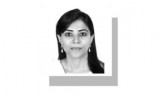Old assumptions, new reality
FEB 8 seems a lifetime away for those of us in the television business. New stories, new crises, the latest headlines have given us a form of ADD. We move on to new excitements with the passing of every minute, or the appearance of ‘breaking news’ on channels. But move outside of the television screens and it seems people are still wondering what happened on that day. How did we get the result we did and how did those who were commenting on it, get it wrong — in case anyone is willing to admit they made an incorrect prediction?
Of course, this is not to say that people were not aware of the situation — the wave of popularity for one side and the lack of support for the other. But that this would translate into the elections result it did (till the night of Feb 8) is perhaps what took many aback. Perhaps this was so because the old assumptions no longer hold and, consequently, neither do our analyses, which we tend to build on the basis of certain assumptions.
When it comes to elections, those in my profession, at least, tend to work with some set assumptions, such as the voter in Punjab tends to vote with the hawa. Or that the hawa can be managed by sending signals as to which party is the favoured one, and that once the voters have decided which way the hawa is blowing, the ‘blocs’ or dharras interested in getting their gas connections, or roads fixed would make the right decisions. In all of this, there are few ‘individual voters’ who........
© Dawn





















 Toi Staff
Toi Staff Gideon Levy
Gideon Levy Andrew Mitrovica
Andrew Mitrovica Belen Fernandez
Belen Fernandez Tarik Cyril Amar
Tarik Cyril Amar Rachel Marsden
Rachel Marsden Warren J. Blumenfeld
Warren J. Blumenfeld Dr Ramzy Baroud
Dr Ramzy Baroud Adam Makary
Adam Makary
